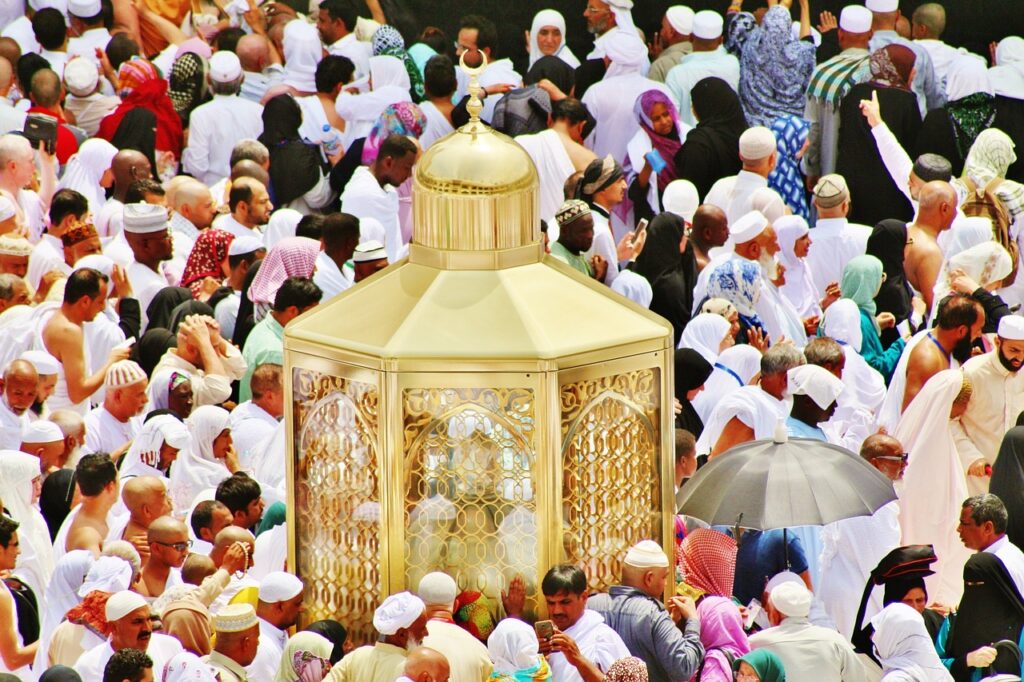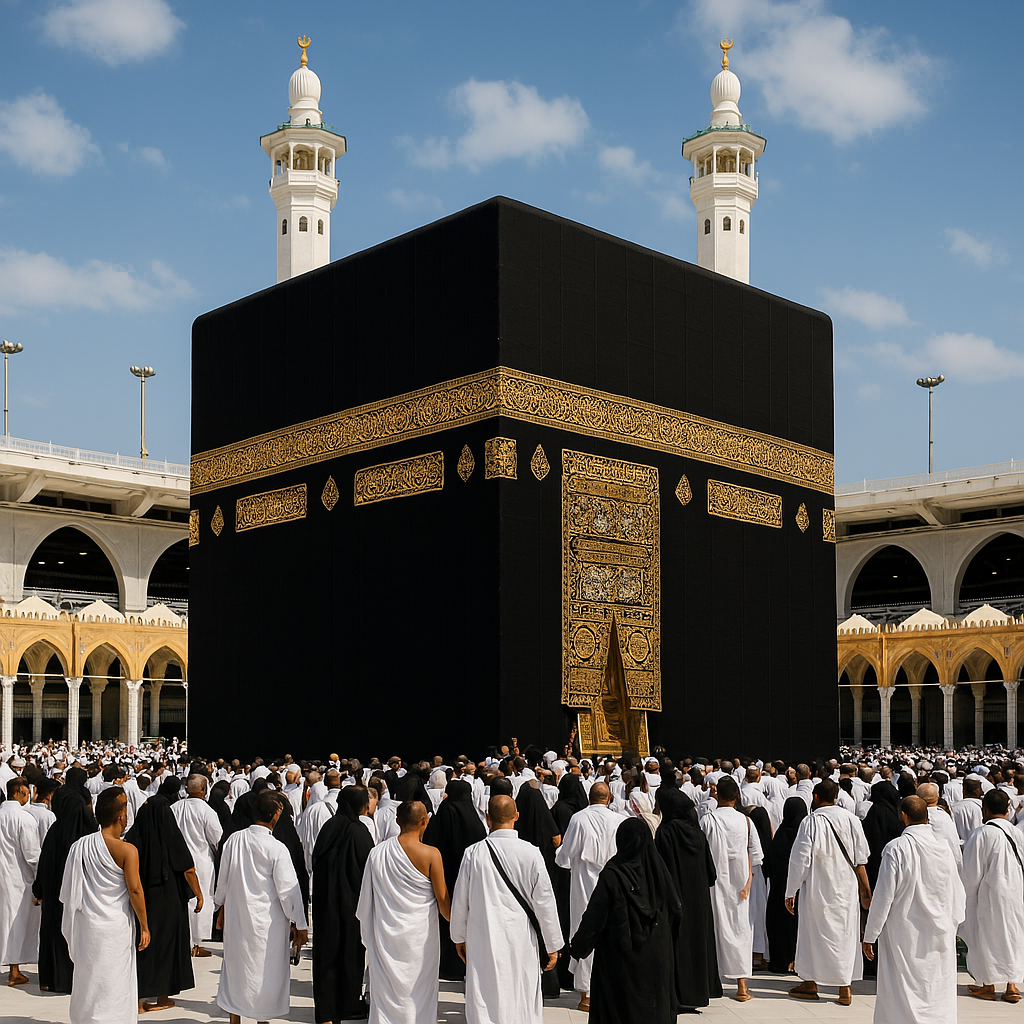
Qurbani : Qurbani in Islam
Qurbani-The first handbook on Eid al-Adha, spirituality, and sacrifice. Decodes the great significance of Qurbani uḍḥiyah 2025 : It is an act of intense loyalty, not only a custom. The Muslim world gets ready for Eid al-Adha, the Festival of Sacrifice, as the holy days of Dhul-Hijjah get near. Fundamentally, Qurbani—also known as Udhiyah—is a profound act of devotion rooted in the history of unwavering faith. Echoing the utmost dedication demonstrated by Prophet Ibrahim (as) and his son Ismail (as), Sacrifice is a great manifestation of devotion to Allah (s.w.t.), far more than a basic ritual. Let us investigate their importance, guidelines, and ageless theological teachings. Echoes of Ibrahim (as).
The Source of Qurbani
The narrative of Udhiyah is firmly ingrained in the Islamic subculture. Ordering Prophet Ibrahim (as) to offer his beloved son, Ismail (as), in a dream, Allah (s.w.t) tested him. Regardless of the emotional load, father and son confirmed the unparalleled commitment and preparedness to follow Allah’s will. Allah (s.w.t.) substituted Ismail (as) with a sparkling ram as Ibrahim (as) got ready to administer the test, therefore verifying its completeness. The Sacrifice practice we study today (Quran, Surah As-Saffat, 37:102–107) is derived from this act of surrender.
Table of Contents
Apart from the meat: The Religious Integrity of Qurbani
The multifarious act of adoration with great religious dimensions is Udhiyah:
1. Emulating Ibrahim (as:)
Muslims are reminded of the height of humility to the Divine Will by this actual re-enactment of the ideal sacrifice.
2–Expression of Gratitude (Shukr):
Shukr, a great way to show thanks to Allah (SWT) for His innumerable blessings: existence, food, faith, and direction.
3- Increasing Taqwa- (God-centeredness):

The act itself encourages piety, reminding us that actual sacrifice entails giving something valuable for the satisfaction of Allah solely. As Allah said, “Their flesh will no more reach Allah, nor their blood, but whatever reaches Allah is piety on your part…” (quran, surah al-hajj, 22:37).
4-Purification and Atonement:
This prayer helps one seek pardon for sins and cleans their wealth and spirit. Supporting Compassion and Networks:
5-Promoting Community & Compassion:
Making meat distribution mandatory guarantees that everyone takes part in the celebration of Eid and guarantees social team spirit and empathy especially to the underprivileged and disadvantaged.
Who ought to lead Qurbani?
Basic guidelines For every sane, adult Muslim with wealth over their essential needs (nisab limit), simplified Udhiyah is regarded as wajib—obligatory—equal to the zakat charge. Not just the family but also every qualified person bears this obligation.
Regarding animals:
Sheep and goats ( minimum age of twelve months), cows and buffalo ( minimum two years of age), and camels ( minimum five years of age) are among permissible animals. Animals have to be healthy, free from common flaws (like blindness, extreme lameness, and extreme thinness), and fit their age.
Timing:
Timing: Perform Udhiyah following Eid prayers on 10 Dhu’l-Hijjah and end on 13 Dhu’l-Hijjah, the day of Tashreeq.
Divide the meat into three portions: one-third for the poor and needy, one-one-third for your family, and one-one-third for close ones and friends. Sunnah (encouraged) Although you are free to keep all the meat if you so choose, giving the less fortunate top priority surprisingly helps and has main benefits. As with any act of worship, a totally honest goal for Allah (SWT) has first importance. Conducting Sacrifice
Today: Practical Issue Instructions: Make sure eligibility is correct. Kindly find the money with respect to Nisab. Adjust the budget to suit. Animal Selection: Get animals from reputable vendors; check their health; follow Islamic guidelines (Halal).Sacrifice: If one has the ability, one can accomplish it; but, assigning a basic representation or business is strange and improper. It is imperative to state at the time the name of Allah (“Bismillah, Allahu Akbar”).
Distribution:
Arrangement of the fair and timely distribution of beef gives the less fortunate. Many trustworthy Islamic charities help Sacrifice internationally so that your Qurbani reaches people in need all around. Days of Dhul-Hijjah: Remember that Dhu l-Hijjah’s first ten days are the holiest. Ibadat, Dhikr (remembrance of Allah), Takbir (“Allahu Akbar”) and rigorous actions abound throughout this period.
Conclusion
Living Legacy of Righteousness and Compassion. Sacrifice is not only a yearly custom linked with Eid al-Adha events. Complete submission to Allah (SWT) is the dynamic act of devotion that helps Muslims to rediscover the core of Islam. It shows the attitude of sacrifice for our ego, our objectives, our attachment to Him, not only for an animal. It makes us reject ourselves and look outside of ourselves.
Frequently Asked Questions (FAQ) about Qurbani (Udhiyah) in Islam
1. First, what is Qurbani?
Muslims perform the ritual sacrifice of a livestock animal during Eid al-Adha, specifically from the 10th to the 13th of Dhul-Hijjah. This practice is known as Qurbani (or Udhiyah). It represents humility, thankfulness, and compassion and honours Prophet Ibrahim’s (AS) unwavering willingness to sacrifice his son Ismail (AS) for Allah’s sake.
2. Is Qurbani required (Wajib)?
Indeed, on the days of Eid al-Adha, Sacrifice is Wajib (obligatory) for any sane adult Muslim who has wealth above the Nisab threshold (the same amount used for Zakat) beyond their necessities. The majority of scholars (Hanafi school) base this on.
3. Who is required to do Qurbani?
Each eligible person, not each household, is responsible for the obligation. Each family member must perform their own Sacrifice if more than one of them satisfies the wealth requirement (Nisab). Even if they independently fit the requirements, a husband is not always in charge of his wife’s Qurbani, just as parents are not in charge of their adult children.
4. Which animals are suitable for sacrifice?
Animals that are allowed include:
Goats or sheep (at least one year old)
Buffalo or cattle (at least two years old)
Camels (at least five years old)
The animals must be healthy, meet the age requirement, and be free of major defects such as blindness, severe lameness, emaciation, or missing teeth or ears.
5. What time is Qurbani performed?
The sacrifice must take place on the tenth day of Dhul-Hijjah, following the Eid al-Adha prayer, and on the thirteenth day of Dhul-Hijjah, before sunset (the Days of Tashreeq). It is strongly advised to perform it on the first day (10th).
6. What is the best way to distribute the Qurbani meat?
Meat is divided into three equal parts according to the Sunnah method:
One-third goes to the individual or family doing Qurbani.
A third for neighbours, friends, and family.
For the needy and impoverished, one-third.
Prioritising the poor is highly encouraged and satisfies a fundamental Sacrifice purpose, even though it is acceptable to save all meat for one’s family if necessary. Every part of the animal should have a useful purpose.
7. Can I perform Qurbani for someone else?
Indeed. You could:
Select a person: Give permission to a reliable individual or group to make the sacrifice on your behalf (standard procedure).
Make a sacrifice for other people: In addition to your own required Sacrifice, perform Sacrifice for eligible family members (parents, spouses, children, etc.) or even departed loved ones. The goal (Niyyah) needs to be obvious.
8. Can I make a charitable donation instead of offering an animal as a sacrifice?
No. Giving to charity (Sadaqah) is always a good thing, but it cannot take the place of the particular ritual act of Sacrifice(Udhiyah). Sacrifice is a unique form of worship with a set schedule and technique. You can, however, give money to a trustworthy organisation that makes the sacrifice and delivers the meat for you.
9. What typical errors should be avoided?
Making a sacrifice before the Eid prayer.
utilising an animal that is not of the appropriate age or health.
Hoarding all the meat while ignoring the underprivileged in distribution.
The meat will deteriorate if distribution is delayed.
not having a clear intention (Niyyah) for Allah (SWT) alone.
wasting any of the animal’s parts that were sacrificed.
10. Can I use an organisation overseas to perform Qurbani?
Yes, without a doubt. Around the world, Qurbani is facilitated by numerous respectable Islamic charities. This is a great way to make sure your sacrifice gets to underprivileged areas that don’t often have access to meat. Make sure the company is reliable, adheres closely to Islamic law, and is transparent.
11. What does it mean to say “Bismillah, Allahu Akbar” when offering a sacrifice?
At the time of sacrifice, it is crucial to utter the name of Allah (“Bismillah” – In the name of Allah) and declare His greatness (“Allahu Akbar” – Allah is the Greatest). It distinguishes the act from any non-Islamic practice and affirms that it is performed exclusively for Allah, seeking His approval.
12. Before performing Qurbani, may I say “Eid Mubarak”?
Eid greetings should normally be delayed until after the Eid prayer. It is a lovely Sunnah custom to exchange “Eid Mubarak” (Blessed Eid) and “Taqabbal Allahu minna wa minkum” (May Allah accept [good deeds] from us and you) after the prayer is finished.
